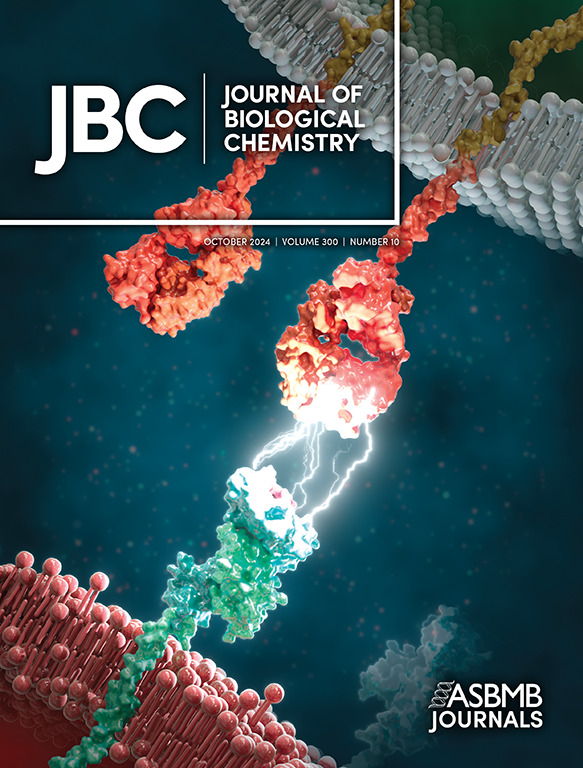Microglial TAK1 promotes neurotoxic astrocytes and cognitive impairment in LPS-induced hippocampal neuroinflammation.
IF 4
2区 生物学
Q2 BIOCHEMISTRY & MOLECULAR BIOLOGY
引用次数: 0
Abstract
The peripheral immune system has a strong effect on the central nervous system (CNS). Systemic lipopolysaccharides (LPS) administration triggers robust microglial activation and induces significant inflammatory responses in the hippocampus. This study investigates the role of Transforming Growth Factor-β-Activated Kinase 1 (TAK1) in mediating LPS-induced hippocampal neuroinflammation and cognitive impairment. Our findings reveal that LPS induces activation of microglial TAK1, which in turn actives downstream effector NF-κB/p65 to release pro-inflammatory cytokines. The activated microglia also promote astrocytes to polarize into a neurotoxic phenotype (A1-like phenotype), and cause the loss of newborn neurons in the hippocampal dentate gyrus (DG). However, TAK1 reduction inhibits microglial responses, limits neurotoxic astrocytes, rescues newborn neurons, and subsequently improves LPS-induced cognitive deficits, suggesting that targeting TAK1 may be an effective strategy for alleviating neuroinflammation. The interaction between TAK1 activation, microglial responses, and the transition of neurotoxic astrocytes enhances our understanding of the cellular dynamics driving LPS-induced neuroinflammation, suggesting that TAK1 may be a therapeutic target for treating cognitive impairment.在脂多糖诱导的海马神经炎症中,小胶质细胞TAK1促进神经毒性星形胶质细胞和认知障碍。
外周免疫系统对中枢神经系统(CNS)有很强的影响。全身脂多糖(LPS)管理触发强大的小胶质细胞激活和诱导显著的炎症反应在海马体。本研究探讨了转化生长因子-β-活化激酶1 (TAK1)在lps诱导的海马神经炎症和认知功能障碍中的作用。我们的研究结果表明,LPS诱导小胶质细胞TAK1活化,进而激活下游效应因子NF-κB/p65释放促炎细胞因子。激活的小胶质细胞也促进星形胶质细胞极化为神经毒性表型(a1样表型),并导致海马齿状回(DG)新生神经元的丢失。然而,TAK1的减少抑制了小胶质细胞反应,限制了神经毒性星形胶质细胞,拯救了新生神经元,并随后改善了lps诱导的认知缺陷,这表明靶向TAK1可能是缓解神经炎症的有效策略。TAK1激活、小胶质细胞反应和神经毒性星形胶质细胞转变之间的相互作用增强了我们对驱动lps诱导的神经炎症的细胞动力学的理解,表明TAK1可能是治疗认知障碍的治疗靶点。
本文章由计算机程序翻译,如有差异,请以英文原文为准。
求助全文
约1分钟内获得全文
求助全文
来源期刊

Journal of Biological Chemistry
Biochemistry, Genetics and Molecular Biology-Biochemistry
自引率
4.20%
发文量
1233
期刊介绍:
The Journal of Biological Chemistry welcomes high-quality science that seeks to elucidate the molecular and cellular basis of biological processes. Papers published in JBC can therefore fall under the umbrellas of not only biological chemistry, chemical biology, or biochemistry, but also allied disciplines such as biophysics, systems biology, RNA biology, immunology, microbiology, neurobiology, epigenetics, computational biology, ’omics, and many more. The outcome of our focus on papers that contribute novel and important mechanistic insights, rather than on a particular topic area, is that JBC is truly a melting pot for scientists across disciplines. In addition, JBC welcomes papers that describe methods that will help scientists push their biochemical inquiries forward and resources that will be of use to the research community.
 求助内容:
求助内容: 应助结果提醒方式:
应助结果提醒方式:


